|
|
|
Sort Order |
|
|
|
Items / Page
|
|
|
|
|
|
|
| Srl | Item |
| 1 |
ID:
117521
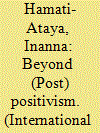

|
|
|
|
|
| Publication |
2012.
|
| Summary/Abstract |
This paper explores Pragmatism's potential for transcending the antagonism between positivism and post-positivism, through the work of Morton Kaplan, who combines a Pragmatist theory of knowledge with a systems theory of world politics. A reconstruction of Kaplan's synoptic philosophy shows how Pragmatism can help us move beyond the dual fallacy of truth as correspondence and truth as self-consciousness, to a non-foundationalist epistemology that acknowledges the historicity of knowing without annihilating the realism of the common world we live in. Moving from the realm of knowledge to the realm of judgment, this paper also reconstructs Kaplan's moral analysis, thereby revealing its significance for the discipline's renewed concern for the problems of values and reflexivity.
|
|
|
|
|
|
|
|
|
|
|
|
|
|
|
|
| 2 |
ID:
107980
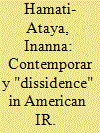

|
|
|
|
|
| Publication |
2011.
|
| Summary/Abstract |
Dissidence in IR, as in any other social field, reflects both an identity and a practice of opposition to the system. While the fact of dissidence is largely manifested in its very discursive occurrence, this article attempts to go beyond the performative nature of dissidence in order to identify the collective, common ground that unites self-acclaimed dissident scholars, to understand whether they form an objectively constituted social group, and to what extent they encompass dissidence in the field. Based on the analysis of a survey sent to American IR academics, this article shows that contemporary dissidence in American IR is structured not only by its opposition to mainstream IR, but also by internal divisions between the first generation of now established Critical dissidents, and an emerging group of Constructivist scholars who do not claim, but do practice, a clearly dissident and more marginalized scholarship.
|
|
|
|
|
|
|
|
|
|
|
|
|
|
|
|
| 3 |
ID:
113856
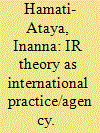

|
|
|
|
|
| Publication |
2012.
|
| Summary/Abstract |
Adopting a reflexive, praxeological understanding of science that rejects the objectivist epistemic antinomy of theory and practice, this article offers two complementary Bourdieusian readings of International Relations theory that specifically aim to conceptualise the structural position of 'periphery' scholars, as well as their extant and potential 'space of possibilities' in the discipline. Grounded in a sociological appraisal of International Relations, the 'clinical' approach objectivates International Relations as a field of international practice wherein the production of theoretical knowledge results from the meeting of different socio-academic habitus and their associated positions with the objective structures of International Relations and the international system. It highlights the relation between International Relations theory and the structural (dis)positions of its authors, the conditions that allow some theories to be objectively possible, meaningful, structuring representations of the world, and the structural constraints imposed on International Relations theorists. The 'cynical' approach suggests how a 'clinical' understanding of International Relations can help marginalised, 'periphery' scholars make sense of their 'space of possibilities' within the discipline, and develop a praxeological, reflexive attitude that could turn them into efficient international agents capable of promoting different scholarly perspectives. More specifically, the article argues that their non-native habitus is a potentially subversive capital - and hence a potential agency of structural change.
|
|
|
|
|
|
|
|
|
|
|
|
|
|
|
|
| 4 |
ID:
100479
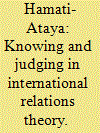

|
|
|
|
|
| Publication |
2010.
|
| Summary/Abstract |
This article addresses the notion of reflexivity in international theory through an attempt to transcend the dichotomy between knowledge and judgement. It intends to demonstrate that neither 'philosophical' nor 'scientific' approaches to world politics can reconcile cognitive and evaluative claims, but that such an endeavour may be envisaged within a certain conception of knowledge, science and facts. A comparison of Morton Kaplan's approach with Hans Morgenthau's and Kenneth Waltz's suggests what kind of theoretical alternatives can bring together these two seemingly incommensurable orders of discourse under a unified, foundationally reflexive epistemology.
|
|
|
|
|
|
|
|
|
|
|
|
|
|
|
|
| 5 |
ID:
156677
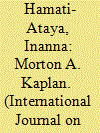

|
|
|
| 6 |
ID:
105720
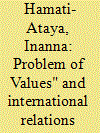

|
|
|
|
|
| Publication |
2011.
|
| Summary/Abstract |
In light of recent discussions of cognitive and ethical dilemmas related to International Relations (IR) scholarship, this paper proposes to engage the "problem of values" in IR as a composite question whose cognitive treatment requires the objectivation of the more profoundly institutional and social processes that subtend its emergence and evolution within the discipline. This analysis is hereby offered as an exercise in reflexive scholarship. Insofar as the question of values constitutes a defining cognitive and moral concern for reflexive knowledge itself, the paper also points to the need for its reformulation within an epistemic framework that is capable of moving beyond reflexivity to Reflexivism proper, understood as a systematic socio-cognitive practice of reflexivity.
|
|
|
|
|
|
|
|
|
|
|
|
|
|
|
|
| 7 |
ID:
158279
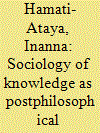

|
|
|
|
|
| Summary/Abstract |
This article first aims to draw attention to, and diagnose, the failure of IR’s sociological turn to extend the domain of sociological reason into the philosophical turf of epistemology and thereby fulfill the full promises of the postpositivist turn. Its second purpose is to revive and deploy the radical version of the sociology of knowledge that can achieve an autonomous reconstruction of epistemology suited to a reflexive, post-Kantian consciousness. The diagnosis begins by tracing the erasure of the radical sociological position in the connected evolutions of sociology and international relations (IR). It shows that the derailing of the “sociological revolution” was paradoxically mediated by the consolidation of social constructionism and science studies, reproduced in IR through their counterparts in the “sociological turn”: constructivism and the sociology of IR. In these otherwise reflexive developments, the progression of sociological reason was halted by a self-imposed limitation on the extension of sociological analysis to all domains of thought and the endorsement of an idealist and institutionalist ontology of the social. A reformulation of the forgotten, radical sociological position clarifies the implications for IR of a transition to a postphilosophical theory of knowledge and delineates an empirical research agenda for such a reconstruction of epistemology driven by a sociology of knowledge of a revolutionary persuasion. Exploring the centrality of social practice in the social determination of knowledge, the article argues that, and shows how, a properly reflexive reconstruction of epistemology is best achieved by deploying the sociology of knowledge in two complementary materialist directions: (1) a sociology of everyday social practices that illuminates our epistemic immersion in the carpentered environments of the socionatural order and (2) a sociology of craft that objectivates the social constitution of the skholè as a mode of existential boundedness by addressing scholarly thought as differentiated social labor.
|
|
|
|
|
|
|
|
|
|
|
|
|
|
|
|
|
|
|
|
|